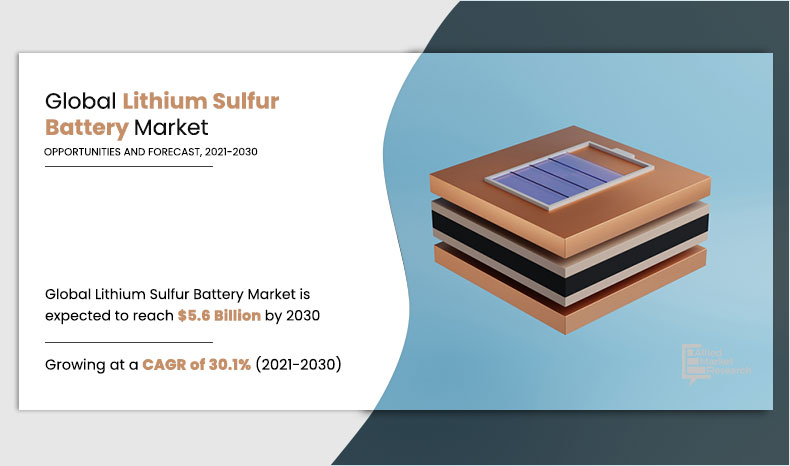
According to a new report published by Allied Market Research, titled, “Lithium Sulfur Battery Market by Type, Power Capacity, and End Use: Global Opportunity Analysis and Industry Forecast, 2020-2030,“The global lithium sulfur battery market size was valued at $0.4 billion in 2020 and is projected to reach $5.6 billion by 2030, with a CAGR of 30.1% from 2021 to 2030.
There are increasing future applications of lithium sulfur battery in planetary landers, planetary rovers, planetary orbiteers, and other satellite equipment. The rapid innovation and development of aerospace technologies led to the increase in space-based activities, which boosted the need for highly efficient power source to drive the equipment. The presence of top aerospace manufacturing companies, such as SpaceX, Boeing, and Airbus, with rapid innovations in the aerospace sector has increased the demand for high energy density storage batteries.
Download Sample Report: https://www.alliedmarketresearch.com/request-sample/12441
In addition, the gradual depletion of resources on the planet and increasing population led to search of suitable habitation places on other celestial bodies, which is also one of the driving factors for the growth of the lithium sulfur battery market. In 2021, Sion Power partnered with Airbus Defense and Space to test its lithium sulfur battery technology. It also has application in Bluetooth devices, such as headphones, and is also as a rechargeable battery for digital cameras, torches, shavers, and other devices. These above mentioned electronic devices are used in the daily life of every individual, thereby increasing the demand for lithium sulfur battery. These are the major driving factors for the growth of the market.
The presence of key issue in the production of lithium sulfur battery is the poly sulfide shuttle effect, which is responsible for leakage of active materials from the cathode results in low life cycle of the battery. In addition, manufacturers are also addressing various issues regarding large volume expansion of sulfur cathode from S to Li2S and large amount of electrolyte needed for the conversion. The above mentioned factors hamper the development of the lithium sulfur battery market.
Government plans to phase out fuel-based vehicles by 2050 and “zero carbon” targets set by governing bodies are also fostering the growth of EVs, which led to increase in demand for lithium sulfur battery. Rapid application of IoT in residential, large-scale commercial building, and smart cities has increased the demand for various sensor and electronic gadgets with specific functions. Increase in demand for all the above-mentioned products will provide ample opportunities for the the lithium sulfur battery market growth during the forecast period.
On the basis of type, the global lithium sulfur battery market is segmented into low energy density and high energy density. The power capacities introduced in the study include 0-500mAh, 501-1,000mAh, and more than 1,000mAh. In addition, end uses include aerospace, automotive, electronic device, power & energy, and others.
Region-wise, the market is studied across North America, Europe, Asia-Pacific, and LAMEA. Presently, North America accounts for the largest share of the market, followed by Europe and Asia-Pacific.
For Purchase Enquiry: https://www.alliedmarketresearch.com/purchase-enquiry/12441
The major companies profiled in this lithium sulfur battery industry report include Advanced Energy Materials, Ilika PLC, Johnson Matthey, LG Chem, Morrow Batteries, NOHMs Technologies, OXIS Energy, PolyPlus, Sion Power, and Williams Advanced. Due to rapidly increasing demand for energy in recent years, governments across the world have set sights on the development of renewable energy sources, which require high energy density storage batteries. Key manufacturers are innovating and expanding their production capacities to meet market demand across the globe. Additional growth strategies, such as new product developments, acquisition, and business expansion strategies, are also adopted to attain key developments in the lithium sulfur battery market trends.
Impact Of Covid-19 On The Global Lithium Sulfur Battery Market
Emergence of COVID-19 had a negative impact on the growth of the global lithium sulfur battery market during this period.
This impact is mostly attributed to significant disruptions in raw material transportation, presence of low-labor, and decline of demand for lithium sulfur battery in the industries due to shutdown.
Decrease in demand for many non-essential products and shutdown of electrical, automotive, and aerospace related industries have created a negative impact on the development of the market.
There is increasing demand for environment-friendly battery products and their ever growing applications in various fields such as EVs, electronic gadgets, and others. The increase in awareness among people regarding the advantages of these products will provide good opportunities for the market.
Thus, the abovementioned factors are expected to limit the global lithium sulfur battery market growth during this forecast period.
Get detailed COVID-19 impact analysis on the Market: https://www.alliedmarketresearch.com/request-for-customization/12441?reqfor=covid
About Us
Allied Market Research (AMR) is a full-service market research and business-consulting wing of Allied Analytics LLP based in Portland, Oregon. Allied Market Research provides global enterprises as well as medium and small businesses with unmatched quality of “Market Research Reports” and “Business Intelligence Solutions.” AMR has a targeted view to provide business insights and consulting to assist its clients to make strategic business decisions and achieve sustainable growth in their respective market domain.
Pawan Kumar, the CEO of Allied Market Research, is leading the organization toward providing high-quality data and insights. We are in professional corporate relations with various companies and this helps us in digging out market data that helps us generate accurate research data tables and confirms utmost accuracy in our market forecasting. Each and every data presented in the reports published by us is extracted through primary interviews with top officials from leading companies of domain concerned. Our secondary data procurement methodology includes deep online and offline research and discussion with knowledgeable professionals and analysts in the industry.